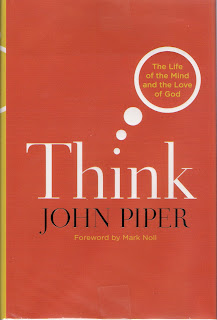Review on Piper's Think
John Piper, (2010), Think: The Life of the Mind and the Love of God (Wheaton, IL: Crossway)
This book by pastor-theologian John Piper reminds me of books on similar theme such as Mark Noll's Scandal of the Evangelical Mind, Os Guinness' Fit Bodies, Fat Minds, J.P. Moreland's Love Your God with All Your Mind and Gene Veith's Loving God with All Your Mind. These scholars and thinkers have written these excellent books (all of which are worth reading) based on their exposure to different worldviews and their effort to create or instill biblical worldviews.
Piper's approach is different in that he draws solely from the Bible and in that he limits himself mainly to Proverbs 2:3-5 and 1 Timothy 2:7. He writes that his approach is that of a Bible expositor and in that he has succeeded because the book read like a series of sermons. Thinking is a serious aspect of discipleship, Piper suggests and that such thinking "is wholly engaged to do all it can to awaken and express the heartfelt fullness of treasuring God above all thing."
This book seems to be seeking a balance between the "anti-intellectualism" of some churches and "over-intellectualism" of the academia, However unlike his other books, I find it difficult to decipher what Piper is really trying to say in this book. While I agree with his emphasis on reading and understanding the Bible (which he equate to thinking) and his asserting that thinking is loving God, I find it difficult to apply his conclusion to the rest of the world who are mostly illiterate, do not have access to the Bible, and to the category of people who are intellectually impaired. And also in most of Africa, Asia and South America, most pastors and Bible teachers are not theologically trained. I refuse to accept that because of these handicaps, the Christians in these regions are defective in their thinking and hence not able to love God with their minds. I believe the power of the Holy Spirit transcend the inability of believers to read and write and that these inabilities do not handicap their relationship with the Triune God.
.
Labels: Book Review, Critical Thinking
















0 Comments:
Post a Comment
<< Home